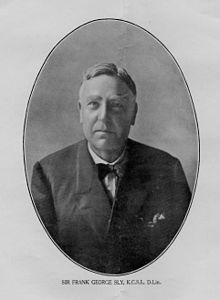| Revision as of 14:33, 23 October 2020 editColonies Chris (talk | contribs)Autopatrolled, Extended confirmed users, Pending changes reviewers, Rollbackers445,694 edits →Career: rmvd incorrect link← Previous edit | Revision as of 20:52, 9 December 2020 edit undoTilt2k (talk | contribs)16 edits →Death and memorials: Corrected inauguration date of railway stationTag: Visual editNext edit → | ||
| Line 22: | Line 22: | ||
| Sly died in London on July 16, 1928.<ref>{{Cite web|url=https://news.google.com/newspapers?nid=2507&dat=19280718&id=hqdAAAAAIBAJ&sjid=eaUMAAAAIBAJ&pg=4121,2496796&hl=en|work=The Glasgow Herald|via=Google News Archive Search|access-date=2016-09-13|title=The Glasgow Herald - Google News Archive Search}}</ref> He is buried in ]. | Sly died in London on July 16, 1928.<ref>{{Cite web|url=https://news.google.com/newspapers?nid=2507&dat=19280718&id=hqdAAAAAIBAJ&sjid=eaUMAAAAIBAJ&pg=4121,2496796&hl=en|work=The Glasgow Herald|via=Google News Archive Search|access-date=2016-09-13|title=The Glasgow Herald - Google News Archive Search}}</ref> He is buried in ]. | ||
| He inaugurated ] on |
He inaugurated ] on 15 January 1925.<ref>{{Cite web|url=http://www.nagpurtoday.in/90-years-of-nagpur-station-building/01142300|title=90 years of Nagpur station Building|website=www.nagpurtoday.in|access-date=2016-09-13}}</ref> A plaque at the station bears his name. | ||
| == References == | == References == | ||
Revision as of 20:52, 9 December 2020

Sir Frank George Sly (1866 – 16 July 1928) was the first British governor of the Central Provinces of India and instrumental in the Montagu–Chelmsford Reforms.
Early life
Frank Sly was born in Salisbury 1866 to Thomas Sly and Clara Moore. He studied at Oxford University before entering the Indian Civil Service towards the end of 1887.
Career
After joining the Indian Civil Service in 1887, Sly was appointed Under-Secretary in the Department of Revenue and Agriculture in 1894. He became officiating Secretary in 1896, before becoming Commissioner of Agriculture and Settlements and later Inspector-General of Agriculture. From 1908–1912 he was Commissioner of Berar Province where he was tasked with remodeling the administration of the province, to bring it in line with the other Central Provinces into which it had recently been amalgamated. In September 1912 he was appointed a member of the Royal Commission on the Public Services. After a brief spell as Commissioner of Nagpur, he was appointed Chairman of the Public Works Department Re-organisation Committee. Sly then went to Bihar and Orissa as Chairman of the Champaran Inquiry Committee. He was later appointed Deputy Chairman of Lord Southborough's Franchise Committee. In January 1920 Sly returned to the Central Provinces and Berar as Chief Commissioner, and later that year was appointed Governor.
Advocate for reform
Sly played a prominent part in shaping the Government of India Act, as a member of the India Office Committee and a witness before the Joint Parliamentary Committee, where he was a strong advocate of the 1919 changes which became known as the Montagu–Chelmsford Reforms.
Family
Sly married Sophie Louisa Dane on September 4, 1900 at Christ Church, Simla in Bengal. Dane was born in India where her father Sir Richard Morris Dane worked in the Indian Civil Service and was in charge of export. They had one child, Joan Clara Sophia Sly, born in 1902. On 28 July 1910, Sir Frank was granted a divorce from Dane on the grounds of "adultery with Hubert Druce". Sly's daughter Joan joined him in India, where she met her future husband John Ray Geddes.
Daughter's suicide
Joan Sly and John Ray Geddes committed suicide on 8 August 1924 at Gordon Street Chambers on Jermyn Street, London. The inquest into their deaths noted that the couple had taken out extensive loans to fund their wedding and subsequent honeymoon, and had run into financial troubles.
Death and memorials
Sly died in London on July 16, 1928. He is buried in Kensal Green Cemetery.
He inaugurated Nagpur Railway Station on 15 January 1925. A plaque at the station bears his name.
References
- "Newspaper Article – SIR FRANK SLY". eresources.nlb.gov.sg. Retrieved 2016-09-13.
- Pateriya, Raghaw Raman (1991-01-01). Provincial Legislatures and the National Movement: A Study in Interaction in Central Provinces and Berar, 1921–37. Northern Book Centre. ISBN 9788185119588.
- "Tiger Hunting in India 1924". 2014-08-03. Retrieved 2016-09-13.
- Wolpert, Stanley (2002-11-28). Gandhi's Passion: The Life and Legacy of Mahatma Gandhi. Oxford University Press. ISBN 9780199923922.
- Nanda, B. R. (2013-07-03). Road to Pakistan: The Life and Times of Mohammad Ali Jinnah. Routledge. ISBN 9781136704772.
- "TRAGEDY IN LONDON FLAT – Husband and Wife Shot | LONDON, Today". The Mail. Adelaide. 9 Aug 1924. Retrieved 2016-09-13 – via Trove.
- "GENERAL CABLE NEWS. – LONDON, Aug. 8". The Sydney Morning Herald. 11 Aug 1924. Retrieved 2016-09-13 – via Trove.
- "The Glasgow Herald - Google News Archive Search". The Glasgow Herald. Retrieved 2016-09-13 – via Google News Archive Search.
- "90 years of Nagpur station Building". www.nagpurtoday.in. Retrieved 2016-09-13.